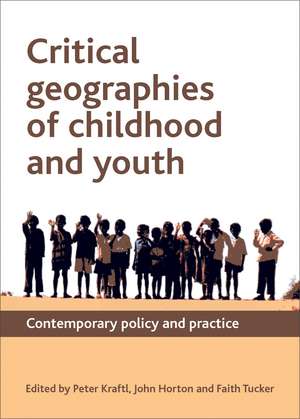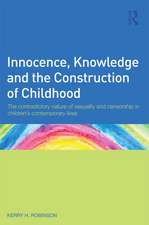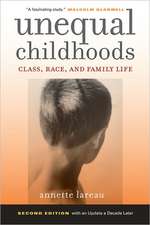Critical Geographies of Childhood and Youth: Contemporary Policy and Practice
Editat de Peter Kraftl, John Horton, Faith Tuckeren Limba Engleză Paperback – 20 mar 2012
This comprehensive book shows how geographical concepts—such as place, scale, mobility, and boundary making—can be put to use by social scientists and practitioners focused on young people. Drawn from cases in Africa, the United States, and the United Kingdom, the essays collected here demonstrate that local and national concerns remain central to many youth programs, while also highlighting the increasingly globalized nature of youth policy. Informed by cutting-edge theoretical approaches in human geography, sociology, anthropology, and youth work, Critical Geographies of Childhood and Youth will aid anyone working in those fields.
| Toate formatele și edițiile | Preț | Express |
|---|---|---|
| Paperback (1) | 343.14 lei 3-5 săpt. | |
| Bristol University Press – 20 mar 2012 | 343.14 lei 3-5 săpt. | |
| Hardback (1) | 835.63 lei 6-8 săpt. | |
| Bristol University Press – 20 mar 2012 | 835.63 lei 6-8 săpt. |
Preț: 343.14 lei
Nou
Puncte Express: 515
Preț estimativ în valută:
65.67€ • 71.31$ • 55.16£
65.67€ • 71.31$ • 55.16£
Carte disponibilă
Livrare economică 01-15 aprilie
Preluare comenzi: 021 569.72.76
Specificații
ISBN-13: 9781847428455
ISBN-10: 1847428452
Pagini: 304
Dimensiuni: 171 x 241 x 18 mm
Greutate: 0.52 kg
Ediția:New.
Editura: Bristol University Press
Colecția Policy Press
ISBN-10: 1847428452
Pagini: 304
Dimensiuni: 171 x 241 x 18 mm
Greutate: 0.52 kg
Ediția:New.
Editura: Bristol University Press
Colecția Policy Press
Notă biografică
Peter Kraftl is a senior lecturer in human geography at the University of Leicester. John Horton and Faith Tucker are both senior lecturers at the Centre for Children and Youth at the University of Northampton.
Cuprins
List of tables, figures and boxes
Notes on contributors
Acknowledgements
1. Editors' introduction: critical geographies of childhood and youth
Peter Kraftl, John Horton and Faith Tucker
Part I: (Inter)national youth policies: politics and practices of spatial translation
2. Making 'youth publics' and 'neuro-citizens': critical geographies of contemporary education practice in the UK
Jessica Pykett
3. Youth policy, neoliberalism and transnational governmentality: a case study of Lesotho and Malawi
Nicola Ansell, Flora Hajdu, Elsbeth Robson, Lorraine van Blerk, Elodie Marandet
4. 'Brighter futures, greener lives': children and young people in UK sustainable development policy
Bethan Evans and Emma-Jay Honeyford
5. Places to go, things to do and people to see: space and activity in English youth work policy
Richard Davies
Part II: Education and employment policies: learning beyond schools and schools beyond learning
6. The place of aspiration in UK widening participation policy: moving up or moving beyond
Gavin Brown
7. School choice versus social cohesion: examining the ways education policies shape children's geographies in the UK
Susie Weller
8. Lunchtime lock-in: territorialisation and UK school meals policies
Jo Pike and Derek Colquhoun
9. Informal education in compulsory schooling in the UK: humanising moments, utopian spaces?
Isabel Cartwright
Part III: Intervening in 'everyday life': scales, practices and the 'spatial imagination' in youth policy and professional practice
10. A free for all? Scale and young people's participation in UK transport planning
John Barker
11. Including young people in heritage conservation in southern Brazilian cities: the case of Pelotas
Laura Novo de Azevedo
12. Anchoring identity: the construction of responsibility for and by young offenders in the US
Alexandra Cox
13. Parenting policy and the geographies of friendship: encounters in an English Sure Start Children's Centre
Eleanor Jupp
14. Youth homelessness policy in Wales: improving housing rights and addressing geographical wrongs
Peter K. Mackie
15. Childhood in South Africa in the time of HIV/AIDS: reconsidering policy and practice
Amy Norman
Part IV: Concluding reflections
16. Concluding reflections: what next and where next for critical geographies of youth policy and practice?
Peter Kraftl, John Horton and Faith Tucker
Notes on contributors
Acknowledgements
1. Editors' introduction: critical geographies of childhood and youth
Peter Kraftl, John Horton and Faith Tucker
Part I: (Inter)national youth policies: politics and practices of spatial translation
2. Making 'youth publics' and 'neuro-citizens': critical geographies of contemporary education practice in the UK
Jessica Pykett
3. Youth policy, neoliberalism and transnational governmentality: a case study of Lesotho and Malawi
Nicola Ansell, Flora Hajdu, Elsbeth Robson, Lorraine van Blerk, Elodie Marandet
4. 'Brighter futures, greener lives': children and young people in UK sustainable development policy
Bethan Evans and Emma-Jay Honeyford
5. Places to go, things to do and people to see: space and activity in English youth work policy
Richard Davies
Part II: Education and employment policies: learning beyond schools and schools beyond learning
6. The place of aspiration in UK widening participation policy: moving up or moving beyond
Gavin Brown
7. School choice versus social cohesion: examining the ways education policies shape children's geographies in the UK
Susie Weller
8. Lunchtime lock-in: territorialisation and UK school meals policies
Jo Pike and Derek Colquhoun
9. Informal education in compulsory schooling in the UK: humanising moments, utopian spaces?
Isabel Cartwright
Part III: Intervening in 'everyday life': scales, practices and the 'spatial imagination' in youth policy and professional practice
10. A free for all? Scale and young people's participation in UK transport planning
John Barker
11. Including young people in heritage conservation in southern Brazilian cities: the case of Pelotas
Laura Novo de Azevedo
12. Anchoring identity: the construction of responsibility for and by young offenders in the US
Alexandra Cox
13. Parenting policy and the geographies of friendship: encounters in an English Sure Start Children's Centre
Eleanor Jupp
14. Youth homelessness policy in Wales: improving housing rights and addressing geographical wrongs
Peter K. Mackie
15. Childhood in South Africa in the time of HIV/AIDS: reconsidering policy and practice
Amy Norman
Part IV: Concluding reflections
16. Concluding reflections: what next and where next for critical geographies of youth policy and practice?
Peter Kraftl, John Horton and Faith Tucker
Recenzii
"How a nation treats its youth determines how those young people will treat their nation. This skilfully edited text critically and theoretically interrogates the complex spatialities of youth and education policies; invaluable reading for those working with, and caring for, children and young people."
“An outstanding critical analysis of youth policy that puts geography centre-stage. Drawing on diverse case studies, the book interweaves theory and practice—listening to and informing practitioner, academic and young people's perspectives.”
“Critical Geographies of Childhood and Youth provides a succinct and diverse analysis of the role of space and place in the geographies of children and youth (e.g. education, work, transportation system). The authors build a strong case that children and youth are the social capital of the present and future and that policy needs to be ‘less interested in children as children and more as human beings.’”
“This edited collection is a welcome addition to literature within children’s geographies due to its unique focus on policy and professional practice in relation to children and young people. Although the sub-discipline is now well established within contemporary human geography—indeed the journal Children’s Geographies is fast approaching its tenth anniversary—there has still been relatively little critical policy analysis of youth programmes, education or other arenas of young people’s lives by geographers. The central contribution of this collection of essays, therefore, is a commitment to theoretically informed critical policy discourse analysis and an explicit aim to highlight the role of geographical concepts (place, scale, mobility and network) in formulations of youth policy and how these matter to young people’s everyday lives.”
“Critical reading for a robust understanding of the lives of children and young people.”
















